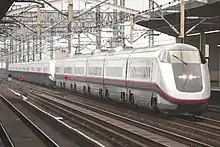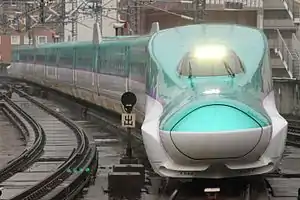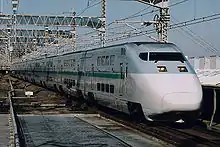Yamabiko
The Yamabiko (やまびこ) is a high-speed Shinkansen train service operated on the Tōhoku Shinkansen between Tokyo and Morioka by East Japan Railway Company (JR East) in Japan.[1]
 An E5 series trainset on a Yamabiko service in May 2022 | |
| Overview | |
|---|---|
| Service type | Shinkansen |
| Status | Operational |
| Locale | Honshu, Japan |
| First service | 1959 (Semi-express) 1982 (Shinkansen) |
| Current operator(s) | JR East |
| Former operator(s) | JNR |
| Route | |
| Termini | Tokyo Sendai, Morioka |
| Distance travelled | 496.5 km (308.5 mi) |
| Line(s) used | Tōhoku Shinkansen |
| On-board services | |
| Class(es) | Standard, Green, Gran Class (E5 and H5 series) |
| Catering facilities | Trolley service (abolished 2019) |
| Technical | |
| Rolling stock | E2 series, E3 series, E5 series, E6 series, H5 series |
| Track gauge | 1,435 mm (4 ft 8+1⁄2 in) |
| Electrification | 25 kV AC, 50 Hz |
| Operating speed | 275 km/h (170 mph) |
Name
The word yamabiko is usually translated as 'echo', particularly one which is heard in the mountains.[2]
Rolling stock
- E2 series (since March 1997)
- E3 series
- E5 series (since November 2011)
- E6 series (since 16 March 2013)[3]
- H5 series (since 26 March 2016)[4]
 E2 series
E2 series E3 series
E3 series E5 series
E5 series E6 series
E6 series H5 series
H5 series
Former rolling stock
- 200 series (June 1982 – November 2011)
- E1 series (Max Yamabiko) (July 1994 – December 1999)
- E4 series (Max Yamabiko) (until 28 September 2012)
.jpg.webp) 200 series
200 series E1 series
E1 series E4 series
E4 series
History
1959–1963: Semi express
On 1 February 1959, the name Yamabiko was introduced on a semi-express (準急, junkyū) service between Fukushima and Morioka on the Tōhoku Main Line. This service operated until 30 September 1963.[5]
1965–1982: Limited express
From 1 October 1965, the name was reintroduced for limited express services operating between Ueno in Tokyo and Morioka. These services continued until 22 June 1982, the day before the Tōhoku Shinkansen opened.[5]
1982–Present: Shinkansen
From the start of services on the newly opened Tōhoku Shinkansen on 23 June 1982, Yamabiko became the name used for the limited-stop shinkansen services operating initially between Ōmiya and Morioka, later between Ueno and Morioka, and eventually between Tokyo and Morioka.[5]
Since 1 July 1992, some Yamabiko services have run coupled with Tsubasa services (as of 2011 formed of E3 series sets) between Tokyo and Fukushima.[1]
From 19 November 2011, E5 series trainsets were introduced on some Yamabiko services, replacing the remaining 200 series-operated services.[6][7]
Special event train services
Sayonara 200 series Yamabiko
On 30 March 2013, a special Sayonara 200 series Yamabiko (さよなら200系やまびこ号) train operated from Morioka to Tokyo, as a farewell run for the 200 series on Yamabiko services.[8]
References
- JR新幹線&特急列車ファイル [JR Shinkansen & Limited Express Train File]. Japan: Kōtsū Shimbun. 2008. ISBN 978-4-330-00608-6.
- "Jisho.org: Japanese Dictionary". jisho.org. Retrieved 29 March 2022.
- JR Timetable, March 2013 =
- 200 series (June 1982 – November 2011)
- E1 series (Max Yamabiko) (July 1994 – December 1999)
- E4 series (Max Yamabiko) (until 28 September 2012) issue
- JR時刻表 [JR Timetable] (in Japanese). Japan: Kotsu Shimbunsha. 2016. p. 978. EAN 4910053110464.
- 列車名鑑1995 [Train Name Directory 1995]. Japan: Railway Journal. August 1995.
- 東北新幹線「はやぶさ」に投入しているE5系車両を「はやて」「やまびこ」に導入! [Tohoku Shinkansen "Hayabusa" E5 series trains to be introduced on "Hayate" and "Yamabiko" services] (PDF). Press release (in Japanese). Japan: East Japan Railway Company. 12 September 2011. Retrieved 12 September 2011.
- 東北新幹線:はやてにもE5系 200系は姿消す [E5 for Tohoku Shinkansen "Hayate" also – 200 series to disappear]. Mainichi.jp (in Japanese). Japan: The Mainichi Newspapers. 12 September 2011. Retrieved 12 September 2011.
- 「さよなら200系やまびこ号」運転 [Sayonara 200 series Yamabiko]. Japan Railfan Magazine Online (in Japanese). Japan: Koyusha Co., Ltd. 1 April 2015. Retrieved 8 June 2015.
External links
- E2 series Hayate/Yamabiko/Nasuno (in Japanese)
- E3 series Tsubasa/Yamabiko/Nasuno (in Japanese)
- E5 series Hayabusa/Hayate/Yamabiko/Nasuno (in Japanese)
- E6 series Komachi/Hayabusa/Yamabiko/Nasuno (in Japanese)


